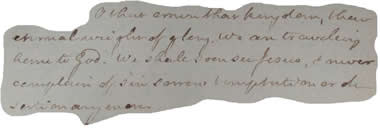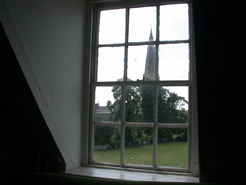Amazing Grace: The Sermon Notes
John Newton’s own sermon notes for his hymn
|
New Year's Morning
[1 January 1773]
1 Chronicles 17:16,17
|
 |
And David the king came and sat before the LORD, and said, Who am I, O LORD God, and what is mine house, that thou hast brought me hitherto? And yet this was a small thing in thine yes, O God, for thou hast also spoken of thy servant’s house for a great while to come, and hast regarded me according to the estate of a man of high degree, O LORD God.
The Lord bestows many blessings upon his people, but unless he likewise gives them a thankful heart, they lose much of the comfort they might have in them. And this is not only a blessing in itself but an earnest of more. When David was peacefully settled in the kingdom, he purposed to express his gratitude by building a place for the Ark. This honour the Lord had appointed for his son Solomon, but he graciously accepted David's intention, for he not only notices the poor services of his people, but even their desires to serve him, when they spring from a principle of simple love, though opportunity should be wanting. He sent him a message by Nathan assuring him that his son should build the house and that he himself would build David's house and establish his kingdom. This filled his heart with praise. My text is part of his acknowledgement. Omitting David's personal concerns, I would accommodate them to our own use as a proper subject for our meditations on the entrance of a new year. They lead us to a consideration of past mercies and future hopes and intimate the frame of mind which becomes us when we contemplate what the Lord has done for us.
"They lead us to a consideration of past mercies and future hopes and intimate the frame of mind which becomes us when we contemplate what the Lord has done for us."
 |
1. Who am I?
The frame of mind: humility and admiration
Who am I, etc. This question should be always upon our minds. Who am I? What was I when the Lord began to manifest his purposes of love? This was often inculcated upon Israel, Thou shalt remember - Look unto the pit from which we were taken. Lord, what is man! At that time we were:
1.1 Miserable
Shut up under the law and unbelief. What must have been the event had the Lord left us there? After a few years spent in vanity, we must have sunk to rise no more.
1.2 Rebellious
Blinded by the god of this world. We had not so much a desire of deliverance. Instead of desiring the Lord's help, we breathed a spirit of defiance against him. His mercy came to us not only undeserved but undesired. Yea [a] few [of] us but resisted his calls, and when he knocked at the door of our hearts endeavoured to shut him out till he overcame us by the power of his grace. See our proper characteristics: Titus 3:3.
 |
1.3 [Undeserving]
It was the Lord against whom we sinned and who showed us mercy. He needed not. What just cause of admiration, that he should appoint such salvation, in such a way, in favour of such helpless, worthless creatures.
2. That thou hast brought me hitherto
Here let us look back:
2.1 Before conversion
His providential care preserving us from a thousand seen, millions of unseen dangers, when we knew him not. His secret guidance, leading us by a way which we knew not, till his time of love came.
2.2 At conversion
The means by which he wrought upon us, supports in the time of conviction, and the never to be forgotten hour when he enabled us to hope in his mercy.
 |
2.3 Since we first were enabled to give up our names to him
Mercy and goodness have followed us. In temporals, he has led and fed us. Many have fallen when we have been preserved, or if afflicted, we have found him a present help in trouble. Some may say, with my staff I passed over this Jordan. In spirituals, preserving us from wasting sins, from gross errors, or restoring and healing, maintaining his hold in our hearts, not withstanding so much opposition, so many temptations and provocations. The comforts we have had in secret and public worship, the seasonable and undoubted answers to prayer. Grace to any dear to us, peace in our families, his blessing with us a church and a people.
3. You have spoken about the future
Are these small things? Yes, compared to what follows - He has spoken for a great while to come, even to Eternity. Present mercies are but earnests of his love, present comforts but foretastes of the joy to which we are hastening. O that crown, that kingdom, that eternal weight of glory! We are travelling home to God. We shall soon see Jesus, and never complain of sin, sorrow, temptation or desertion any more.
 |
He has dealt with us according to the estate of a man of high degree. He found us upon the dunghill and has made us companions of princes - in a wilderness and has led us to the City of God.
From hence infer:
1. Love, gratitude, obedience
Romans 12:1 [I beseech you therefore, brethren, by the mercies of God, that ye present your bodies a living sacrifice, holy, acceptable unto God, which is your reasonable service.]
2. Trust and confidence
We have good reason to cast our cares upon him, and to be satisfied with his appointments. Hitherto he has done all things well [Mark 7:37].
3. Patience
Yet a little while and we shall be at home. Romans 13:11 [And that, knowing the time, that now it is high time to awake out of sleep: for now is our salvation nearer than when we first believed].
We are spared thus far - But some, I fear, are strangers to the promises. You are entered upon a New Year. It may be your last. You are at present barren trees in the vineyard. O fear lest the sentence should go forth - Cut it down.
Transcribed from John Newton’s sermon notebook, Lambeth Palace Library, MS 2940
© Marylynn Rouse 2000
Within a few hours of preaching this sermon, John Newton wrote in his diary:
 |
|
"I preached this Forenoon from 1 Chron. 17.16,17.
Hope I was enabled to speak with some liberty, but found my own heart sadly unaffected."
|
Transcribed from Princeton University Library, John Newton Diary, CO199
©Marylynn Rouse 2000
 |
View from the attic study where Newton wrote the diary entry.
|
|